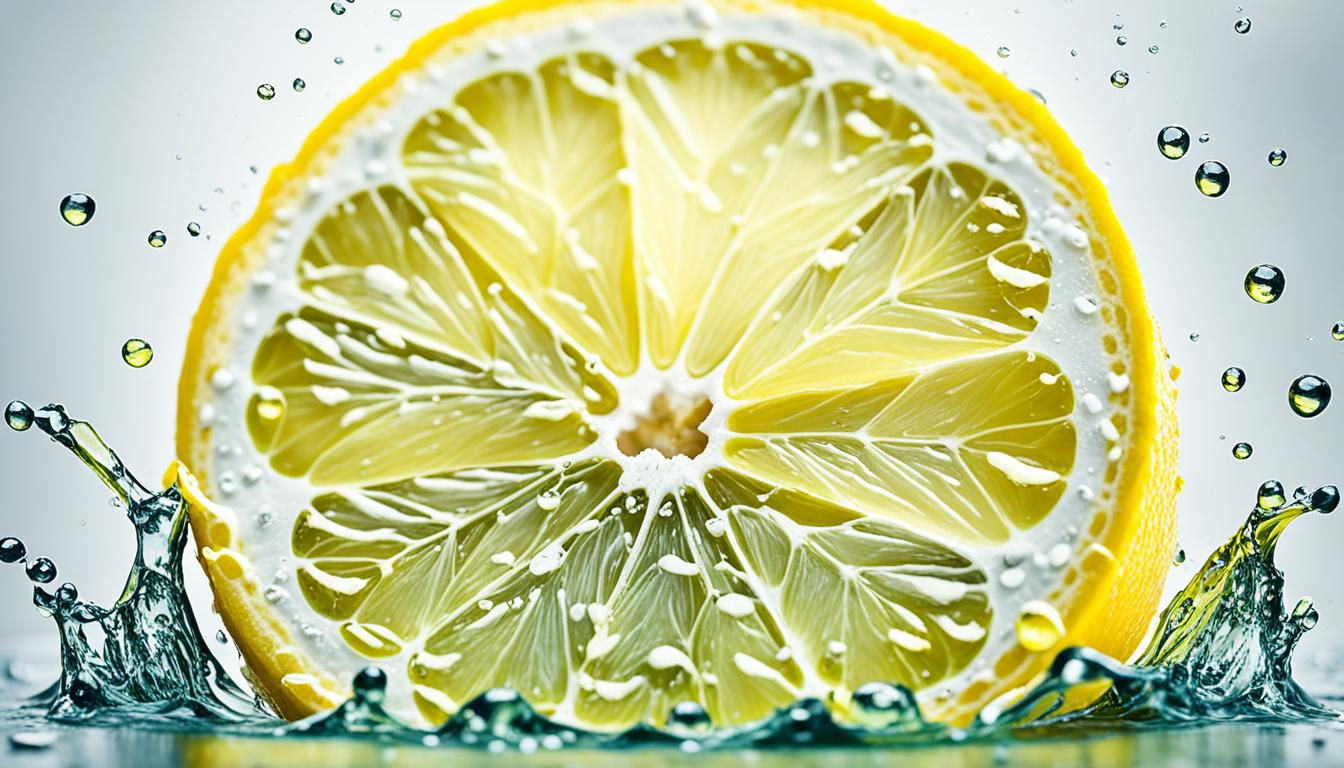Looking in the mirror, I saw dark spots on my once-bright skin. They made me feel frustrated and self-conscious.
Yeap, what you are thinking is right; it’s age spots!
I tried many creams and treatments, but nothing worked well. Then, I found out about lemon juice. It’s a simple, natural way to fade age spots and bring back my skin’s glow.
Based on my experience, let’s explore how lemon juice can help remove your age spots.
What are the Age Spots?
Age spots, also known as liver spots or solar lentigines, are flat, discoloured patches on the skin. They are usually brown, grey, or black and appear on sun-exposed areas like the face, hands, shoulders, and arms. These spots are a sign of aging, caused by years of sun exposure that make the skin produce more melanin.

Age Spots
According to Mayo Clinic;
"Age spots are common in those over 50, but younger people might get them if they spend time in the sun."
What Causes Age Spots?
The main cause of age spots is sun exposure. It makes our skin produce too much melanin, which changes its color. Fair skin tones are more likely to get age spots because they have less melanin. But anyone can get them if they’ve had too much sun.
Age spots are more likely to appear on parts of your skin that are exposed to the sun the most, like:
- face
- backhands
- shoulders
- upper back
- forearms
Other things that might make age spots appear include:
- Genetics and skin tone
Hormonal changes are important, especially during menopause and pregnancy.
Certain medications affect a person’s skin sensitivity to sunlight.
- Chronic inflammation or skin injuries.
Who is sensitive to age spots?
Age spots can appear on anyone, but they’re more common in certain groups.
- Around 20% of people with white skin are under the age of 35, and 90% of individuals are over 60.
People with a history of fair skin.
Sun exposure is the most common cause of aging spots.
- People who have a history of frequent tanning bed use.
"Natural methods provide gentler, less expensive approaches to eliminate age spots."

Why Seek Natural Remedies?
Many of us (even me too) don’t like how age spots look and want to get rid of them. There are medical treatments like chemical peels, laser therapy, and creams, but some prefer natural remedies. Options like lemon juice, apple cider vinegar, and sandalwood powder are good for those who don’t want to use harsh chemicals or spend a lot on treatments.
"Natural methods provide gentler, less expensive approaches to eliminate age spots.
Understanding the Power of Lemon (Juice)
Lemon has been a natural remedy for centuries. It helps fade age spots and even out skin tone. The key ingredients, vitamin C and citric acid, make it effective for treating age spots.
Vitamin C: Nature’s Brightening Agent
Vitamin C is a strong antioxidant. It stops the production of melanin, the pigment that causes age spots. This procedure helps get rid of aging spots.
The Role of Citric Acid in Skin Renewal
Citric acid is a natural alpha-hydroxy acid. It gently exfoliates the skin, removing the top layer of discolored cells. This reveals newer, brighter skin underneath. This procedure helps get rid of aging spots.
The benefits of lemon for the skin include its high vitamin C content and citric acid. These ingredients address the root causes of age spots. They provide a gentle and effective way to achieve a more even, youthful-looking complexion.
"A 2011 study found that black tea water lightened tanned spots on guinea pigs. It was applied twice daily, six days a week for four weeks."
But lemon juice might not have enough vitamin C or citric acid for big results. Studies say you need at least 10% vitamin C for noticeable skin brightening. Lemon juice usually has less than 4%.
Lemon juice is also quite acidic, with a pH of 2-3. This can dry out and irritate the skin if used too much or without care. Always test it on a small part of your skin before applying it.
The Benefits of a Lemon Juice Age Spot Treatment
Lemon is a great natural way to fight age spots. It’s full of Vitamin C, an antioxidant that brightens and evens skin tone. The citric acid in lemon helps renew skin, gently removing dead skin to show healthier skin underneath.
Lemon juice also has antimicrobial and anti-inflammatory effects. It can fight bacteria that cause acne and help with conditions like Candida rashes, scalp fungus, psoriasis, and dandruff.
The antioxidant content in lemon protects the skin from UV rays that speed up aging and cause age spots. Drinking lemon juice helps to prevent and treat age spots over time.
[table id=14 /]

How to Remove Age Spots Naturally with Lemon Juice
Looking for a natural solution to treat age spots?
The lemon is your answer. It’s a strong remedy that fades age spots. Vitamin C and citric acid in lemon juice help you get rid of those blemishes. This means a brighter, more even skin tone for you.
Preparing the Lemon Juice Solution
To start, squeeze juice from a fresh lemon. You can use it straight or mix it with water. If your skin is sensitive, the water mix is better. But for tough spots, pure lemon juice works best.
Application Techniques for Effective Results
Apply the lemon juice right on the age spots, not the healthy skin around them. Allow it to rest for 10-15 minutes, then rinse with cold water. Do this once a day for weeks to see your spots fade.
“I used to spend hundreds of dollars on expensive skincare products, but nothing worked as well as the simple lemon juice remedy. It’s a game changer for fading my age spots.” – Jackie Rogers, 55-year-old skin care specialist.
Safety Precautions and Considerations
When you are thinking about lemon Juice for age spots, it’s important to be careful about your skin. If you have sensitive skin, then it can dry out and irritate your skin. Before adding lemon to your skincare routine, do a patch test to check for any bad reactions on your skin.
Patch Testing for Skin Sensitivity
For a patch test, put a small amount of lemon on a hidden skin area. This could be the inside of your arm or behind your ear. Watch for signs of irritation, like redness, swelling, or dryness, for 24-48 hours. If you don’t see any issues, you can safely use lemon for your age spots. But if you feel any discomfort, stop using it and look for other natural remedies.

Patch Testing
Also, be careful about going out in the sun after using lemon. Citric acid makes your skin sensitive to the sun. This could cause more color changes or harm. Don’t forget to use a broad-spectrum sunscreen with SPF 30 or higher outside after using lemon juice.
Combining with Other Natural Ingredients
For better results, mix lemon juice with other natural items that brighten the skin. Here are some ideas:
- Honey: Adding honey to lemon juice boosts its effects. Honey’s antioxidants soothe and nourish the skin. Lemon brightens and lightens dark spots.
- Aloe Vera: Aloe vera’s anti-inflammatory effects calm lemon juice irritation. It’s perfect for fighting age spots.
- Rose Water: Mixing lemon juice with rose water lowers its acidity. It’s gentler on sensitive skin.
Before combining lemon juice with other ingredients, test it on a small area of your skin. Start with equal parts lemon juice and the other ingredient. Adjust the ratio based on how your skin reacts.
Adding lemon juice to your daily skincare routine is a natural way to tackle age spots. Mixing it with other ingredients boosts its brightening effects. This can help you get a smoother, brighter complexion.
Five Natural Age Spot Remedies: Alternatives to Lemon Juice
Lemon juice is great for fading age spots, but there are other natural options too. Here are five alternatives that can help reduce age spots:
- Aloe Vera Gel: Aloe vera has enzymes that fix damaged skin cells and make new, healthy ones. It also softens and moisturizes the skin.
- Apple Cider Vinegar: Mix apple cider vinegar with water to lighten sunspots and even skin tone. The vinegar exfoliates the skin and fades pigmentation.
- Vitamin C Serum: L-ascorbic acid, a form of vitamin C, boosts collagen production.
- Honey: Honey exfoliates and brightens the skin, fading age spots. Its sugars help remove dead skin, making the skin even-toned.
- Papaya: Papaya has papain, an enzyme that breaks down age spot pigment. This leads to lighter skin areas over time.
[table id=15 /]
These natural remedies work well, but be patient and consistent. Age spots take years to form, so results may take weeks or months. Always consult a dermatologist for advice on the best treatment for your skin.

Success Stories: Real-Life Experiences with Lemon Juice
Many people have seen great results using lemon juice to fade age spots. Here are some real stories that show how effective this citrus fruit can be:
"I had read about the benefits of lemon water prior to this experiment, so I was curious to see how it would affect my typically sensitive skin.
After 30 days, I found that my skin was a bit brighter and clearer following my cup of hot lemon water. Although it wasn’t a drastic difference, I did notice fewer blemishes and less midday oil by the end of the month. .” – Holly Smith,42
Holly also noticed less bloating from the lemon’s diuretic effects and possibly a stronger immune system. She didn’t get sick that week. But she did get thirsty and had a weird taste if she wasn’t drinking enough water. Still, her skin looked better, making her think about keeping lemon water in her daily routine.
"Drinking lemon water in the morning has been touted as a miracle worker. I found that the lemon water helped with my breath. Having been cursed with bad breath, mornings have always been a particularly difficult time for me." - Emily, 55
Conclusion
Lemon juice is a great, natural way to fade age spots. So, you can add lemon juice to your skincare. It’s vitamin C and citric acid help you stop melanin production and gently remove dead skin. Remember to do a patch test first.
Let me know about your experience using lemon juice. Just comment below! Thanks, everyone.
Frequently Asked Questions
- Is using lemon juice on the skin safe?Lemon juice can lighten age spots but be careful. It might irritate sensitive skin. Also, don’t go out in the sun after using it, as it can increase sunburn risk.
- How long does it take to see results from using lemon juice?Results from lemon juice vary by person. Some see changes in weeks, others in months with regular use. Be patient and keep using it to see results.
Resources
- webmd.com/beauty/ss/slideshow-how-fade-age-spots
- aarp.org/entertainment/style-trends/info-2018/natural-remedies-age-spots-fd.html
- healthline.com/health/lemon-for-face

